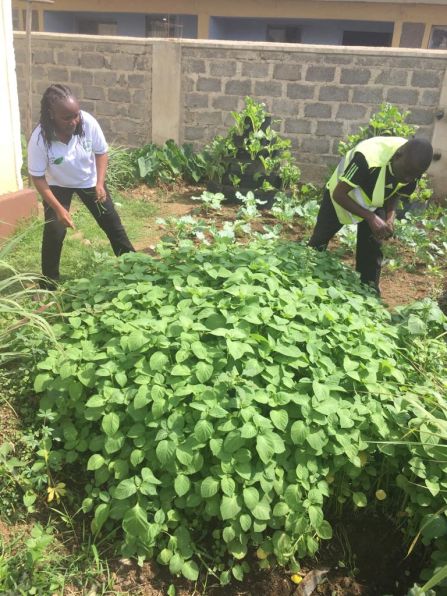Caryle Enterprises from Kenya: a Pioneer of Circular Waste-to-Value Initiatives
| Date |
Date
|

Caryle Enterprises is a circular waste-to-value initiative driven by a mission to promote sustainable organic farming. The enterprise’s Urban Organic Farming initiative promotes healthy living while tackling the pressing issues of climate change related to destructive practices such as burning agricultural leftovers and food waste.
Caryle Enterprises participated in the Circular Economy Catalyst (CEC) Starter Programme and earned a grant in recognition of their exceptional progress and active engagement throughout the programme. Their commitment to sustainable practices and innovative solutions sets them apart as a dynamic and innovative enterprise.
Applying Circular Economy Approach in Organic Farming
Caryle Enterprises came up with a simple yet effective solution to reconcile the issues that climate change poses and the need for promotion of a healthy lifestyle. By advocating for organic farming and repurposing agricultural remnants into eco-friendly fertiliser, they have effectively reduced carbon footprints, improved soil health, and enhanced the resilience of natural ecosystems. The enterprise offers a diverse range of organic fertilisers tailored to specific agricultural needs, with a focus on maximising the growth and health of African Green Leafy Vegetables (ALVs) and various nutrient-rich fruit and medicinal tree seedlings.
Furthermore, Caryle Enterprises extends its impact through capacity-building training in organic farming, agroforestry, agribusiness, and waste management. This educational initiative aims to spread awareness and deepen the knowledge of sustainable agricultural practices among the population of Kenya.
These initiatives and the circular approach at the heart Caryle Enterprises’ endeavours demonstrates their unwavering commitment to a greener, more sustainable future, which is one of the main reasons why they were selected for the CEC Starter Grant of 1000 EUR.
Spending Intelligently and Setting an Example
The grant was invested by Caryle Enterprises into a demonstration farm, which serves as a testing ground for different composting methods and techniques to optimise its processes and improve the quality of the compost. Moreover, their demonstration farms serve as active classrooms, fostering a holistic approach to sustainable agriculture and environmental stewardship.
Caren Ajwang, founder & CEO of Caryle Enterprises, expresses gratitude for the grant, stating: “The CEC Grant enabled us to establish the physical infrastructure and essential equipment required for the demonstration farm, including composting tools and facilities”. Furthermore, Caryle Enterprises has also received another grant through the JAMII Femme programme organised by Women in Africa and Coca-Cola Foundation, which was allocated for professional training and strengthening the team’s expertise in the implementation of diverse composting methods and techniques.
Caryle Enterprises are not intending to stop here, as they are actively in the process of securing additional funding with specific focus on improving their marketing to promote the demonstration farm. This aims to extend their reach to a broader audience, amplifying awareness about the benefits of composting and the circular economy.
Having Proof of Quality and Impact
After investing the CEC grant in the demonstration farm, Caryle Enterprises was able to focus on refining and optimising their composting processes, which resulted in higher-quality organic fertilisers. They are now able to experiment with various techniques to determine the most efficient and effective composting methods.
Caren Ajwang believes that the CEC Grant has been instrumental in achieving it, as she states: “The demonstration farm, in this context, plays a pivotal role. It serves not only as a testing ground but also as a dynamic training platform, which beyond helping us refine our own knowledge and skills, also allowed us to share this expertise with our customers - households from informal settlements in Kisumu town who are keen on producing their own food. As a result, we have gained a deeper understanding of the needs and challenges faced by our target customers, leading to the development of more tailored products and services”.
The demonstration farm itself became a tangible proof of concept for the effectiveness of the circular approach championed by Caryle Enterprises, as it showcases the practical application of the organic fertilisers and their positive impact on crop yields and soil health to the potential customers and investors.
Refining the Business Model
Sustainability has been at the core of Caryle Enterprises’ approach, as they are able to continue reducing waste and lowering their carbon footprint through recycling and composting, as they bring circular economy approach to life.
Caryle Enterprises remains committed to sustainable practices, continuously reducing waste and lowering their carbon footprint through recycling and composting. By expanding their Advisory Board to include experts in composting and organic farming techniques, they have strengthened their business model, enhancing their capacity to produce high-quality organic fertilisers and provide valuable training to farmers.
Caren Ajwang is confident in Caryle Enterprises' ability to continue improving and providing training on organic farming and composting. She asserts: “Today, we are well-prepared to provide comprehensive training programmes on organic farming and composting to an ever-expanding community of farmers and growers, helping them adopt sustainable practices. With these advancements, we are confident that we will continue to strengthen our position as a prominent advocate for sustainable agriculture, not only in Kisumu County but also across the other 19 counties that constitute the Lake Region bloc in Kenya. Our commitment to a greener, more sustainable future remains unwavering”.
